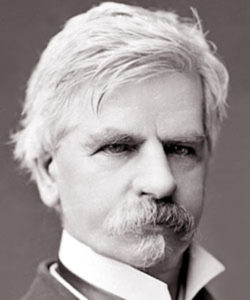
Nathaniel Banks
*Nathaniel Banks was born on this date in 1816. He was a white-American politician and a military officer.
Nathaniel Prentice Banks was born in Waltham, Massachusetts, and was the first child of Nathaniel P. Banks, Sr., and Rebecca Greenwood Banks. His father worked in the textile mill of the Boston Manufacturing Company, eventually becoming a foreman. Banks went to local schools until the age of fourteen, when the family's financial demands compelled him to take a mill job. He started as a bobbin boy, responsible for replacing bobbins full of thread with empty ones, working in the mills of Waltham and Lowell. Because of this role, he became known as Bobbin Boy Banks, a nickname he carried throughout his life.
Banks continued to read, sometimes walking to Boston on his days off to visit the Atheneum Library. He attended company-sponsored lectures by luminaries of the day, including Daniel Webster and other orators. He formed a debate club with other mill workers to improve their speaking skills and took up acting. He became involved in the local temperance movement; speaking at its events brought him to the attention of Democratic Party leaders, who asked him to speak at campaign events during the 1840 elections.
In 1848, Banks was the first moderate in opposition to expanding slavery. Still, recognizing the potency of the abolitionist movement, he became more firmly attached to that cause as a vehicle for political advancement. This brought Banks, along with fellow Democrats Rantoul and George S. Boutwell, to form a coalition with the Free-Soil Party that successfully gained control of the legislature and governor's chair. The deals negotiated after the coalition win in the 1850 election made Banks the Massachusetts House of Representatives Speaker. Although Banks did not like the radical Free Soil member Charles Sumner, he supported the coalition agreement that resulted in Sumner's election to the United States Senate despite opposition from conservative Democrats. His role as house speaker and his effectiveness in conducting business raised his status significantly, as did his publicity work for the state Board of Education.
During the American Civil War, President Lincoln appointed Banks as one of the first 'political' major generals over the heads of West Point regulars, who initially resented him but came to acknowledge his influence on the war administration. After suffering a series of inglorious setbacks in the Shenandoah River Valley at the hands of Stonewall Jackson, Banks replaced Benjamin Butler at New Orleans as commander of the Department of the Gulf, charged with administering Louisiana and gaining control of the Mississippi River.
He commanded the XIX corps. He failed to reinforce Grant at Vicksburg and poorly handled the Siege of Port Hudson, taking its surrender only after Vicksburg had fallen. He then launched the Red River Campaign, a failed attempt to occupy northern Louisiana and eastern Texas that prompted his recall. Banks was regularly criticized for the failures of his campaigns, notably in tactically essential tasks, including surveillance.
Banks was also instrumental in early reconstruction efforts in Louisiana, intended by Lincoln as a model for later such activities. After the war, Banks returned to the Massachusetts political scene, serving in Congress, where he supported Manifest Destiny, influenced the Alaska Purchase legislation, and supported women's suffrage. In his later years, he adopted more liberal progressive causes and served as a United States marshal for Massachusetts before suffering a decline in his mental faculties. In 1888, Banks once again won a seat in Congress. He did not have much influence because his mental health was failing.
After one term, he was not renominated and retired to Waltham. His health continued to deteriorate, and he was briefly sent to McLean Hospital shortly before he died in Waltham on September 1, 1894. His death made nationwide headlines; he is buried in Waltham's Grove Hill Cemetery.